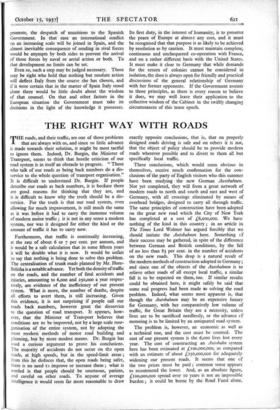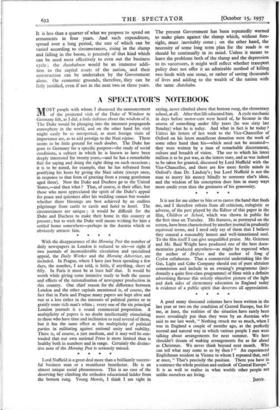THE RIGHT WAY WITH ROADS
THE roads, and their traffic, are one of those problems that are always with us, and since so little advance is made towards their solution, it might be most tactful to ignore them. Indeed, Dr. Burgin, the Minister of Transport, seems to think that hostile criticism of our road system is in itself an obstacle to progress. "Those who talk of our roads as being back numbers do a dis- service to the whole question of transport organisation." It is difficult to understand Dr. Burgin. If people describe our roads as back numbers, it is because there are good reasons for thinking that they are, and it is difficult to know why the truth should be a dis- service. For the truth is that our road system, even allowing for much improvement, is still much the same as it was before it had to carry the immense volume of modern motor traffic ; it is not in any sense a modern system, nor was it designed for either the kind or the amount of traffic it has to carry now.
Furthermore, that traffic is continually increasing, at the rate of about 6 or 7 per cent. per annum, and it would be a safe calculation that in some fifteen years it will be double what it is now. It would be unfair to say that nothing is being done to solve this problem. The centralisation of trunk roads planned by Mr. lore- Belisha is a notable advance. Yet both the density of traffic on the roads, and the number of fatal accidents and injuries, amounting to 6,000 and 250,000 a year respec- tively, are evidence of the inefficiency of our present system. What is more, the number of deaths, despite all efforts to avert them, is still increasing. Given this evidence, it is not surprising if people call our roads back numbers, however great the disservice to the question of road transport. It appears, how- ever, that the Minister of Transport believes that conditions are to be improved, not by a large scale reor- ganisation of the entire system, not by adopting the most modern methods of motor road building and planning, but by more modest means. Dr. Burgin has used a curious argument to prove his conclusions. The majority of accidents do not occur on the open roads, at high speeds, but in the speed-limit areas ; from this he deduces that, the open roads being safer, there is no need t3 improve or increase them ; what is needed is that people should be courteous, patient, and careful on other roads. To anyone of average intelligence it would seem far more reasonable to draw exactly opposite conclusions, that is, that on properly designed roads driving is safe and on others it is not, that the object of policy should be to provide modern roads wherever possible and to divert to them all but specifically local traffic.
These conclusions, which would seem obvious in themselves, receive much confirmation for the con- clusions of the party of English visitors who this summer have been studying the new German Autobahnen. Not yet completed, they will form a great network of modern roads to north and south and east and west of Germany, with all crossings eliminated by means of overhead bridges, designed to carry all through traffic. The same principles of construction have been adopted on the great new road which the City of New York has completed at a cost of £6,000,000. We have nothing of the kind in this country ; in an article in The Times Lord Wollner has argued forcibly that we should imitate the Autobahnen here. Something et their success may be gathered, in spite of the difference between German and British conditions, by the fall of no less than 83 per cent. in the number of accidents on the new roads. This drop is a natural result of the modern methods of construction adopted in Germany; and since one of the objects of the Autobahnen is to relieve other roads of all except local traffic, a similar fall is to be expected on them, too. If similar results could be obtained here, it might safely be said that some real progress had been made to solving the road problem. Indeed, what seems most apparent is, that though the Autobahnen may be an expensive luxury for Germany, with her comparatively low volume of traffic, for Great Britain they are a necessity, unless lives are to be sacrificed needlessly, or the advance et motoring is to be limited by an antiquated road system.
The problem is, however, an economic as well as a technical one, and the cost must be counted. The cost of our present system is the 6,000 lives lost every year. The cost of constructing an Autobahn system here has been estimated at £100,000,000, as compared with an estimate of about £250,000,000 for adequately widening our present roads. It seems that one of the two prices must be paid ; common sense appears to recommend the lower. And, as an absolute figure, £loo,000,000 spread over to years is not an impossible burden ; it could be borne by the Road Fund alone. It is less than a quarter of what we propose to spend on armaments in four years. And such expenditure, spread over a long period, the rate of which can be varied according to circumstances, rising in the slump and falling in the boom, is precisely of that kind which can be used most effectively to even out the business cycle ; the Autobahnen would be an immense addi- tion to the capital assets of the nation, and their construction can be undertaken by the Government alone. On economic grounds, therefore, they can be fully justified, even if not in the next two or three years. The present Government has been repeatedly warned to make plans against the slump which, without fore- sight, must inevitably come ; on the other hand, the necessity of some long term plan for the roads is or should be continually in its mind. Unless it means to leave the problems both of the slump and the depression to its successors, it might well reflect whether transport policy does not offer it an admirable method of killing two birds with one stone, or rather of saving thousands of lives and adding to the wealth of the nation with the same Autobahn.























































 Previous page
Previous page